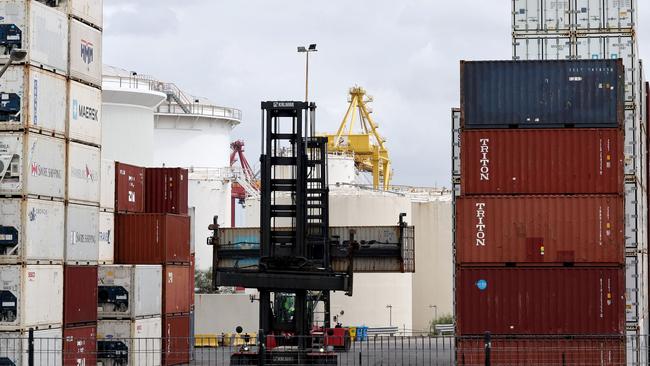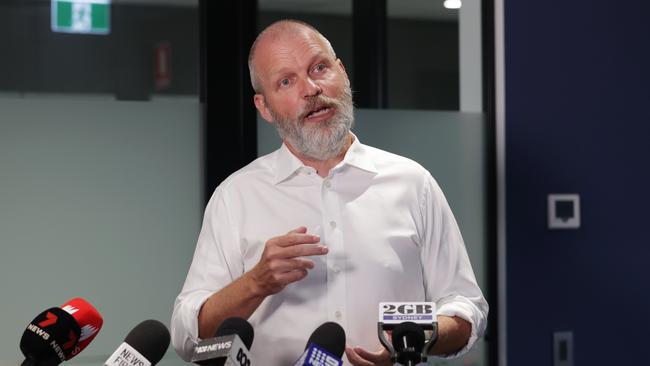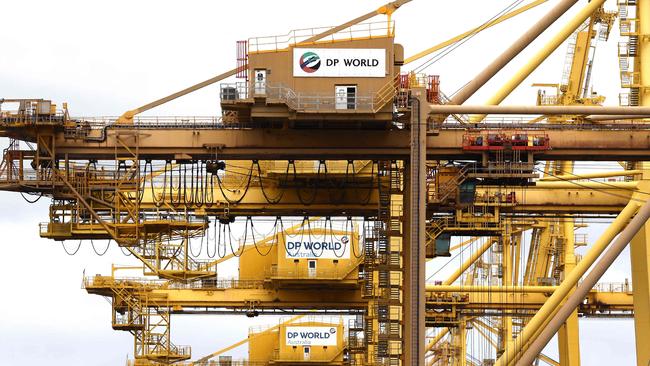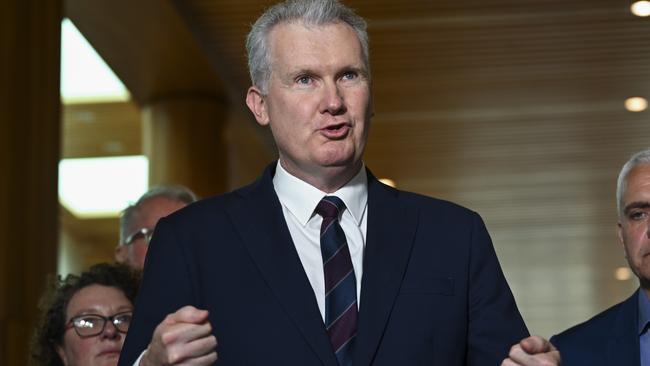Tony Burke refuses to intervene in DP World’s IR dispute
Retailers say essential back to school items may be missing from shelves due as Workplace Relations Minister Tony Burke refuses to intervene in the stoush.

Workplace Relations Minister Tony Burke said the nation’s second biggest port operator DP World is “misguided” if it thinks he will intervene in the industrial relations dispute that the stevedore has said has so far cost the nation $84m per day since it began in October.
Mr Burke told a press conference his meetings with DP World and the Maritime Union of Australia on Thursday morning took place at his instigation - even though DP World said it had previously not been able to lock in a meeting with him at all.
Thursday’s meeting was the first time DP World Oceania vice president Nicolaj Noes had ever met with Mr Burke. However the catch up clearly did not work to his advantage, with Mr Burke making it clear he had “no intention of intervening.”
“The concept that, where every other business in Australia is expected to negotiate with their workforce, but this business wants to rely on ministerial intervention, is not a view that impresses me,” said Mr Bourke. “I expect them to do the same as every other business in Australia. I think, certainly, their presumption that they would find a political answer, rather than do what every other business in Australia is expected to do, was misguided.”

Mr Burke also raised the Mr Noes’ threat in his previous role at Svitzer Tugs to “effectively.. shut down every single major port in Australia.” He also disagreed with DP World’s view on the economic cost and declared the company to be “one of the most profitable businesses in the world.”
Dubai-based DP World globally made a profit of US$1.2bn in 2022. By comparison, Saudi Arabian oil company Saudi Aramco earned US$247bn last year. In Australia, BHP made $US14bn and Commonwealth Bank of Australia made $10bn.
The nation’s second biggest stevedore had hoped the government would intervene early because Australia, as an island nation, largely relies on shipping to export and import goods. DP World accounts for about 40 per cent of all container stevedoring.
“DP World’s request for government intervention is driven by the severe economic impact of customer frustration and a substantial backlog of containers,” said Mr Noes after Mr Burke’s surprising press conference.
“The company is committed to the Fair Work Commission process to find a fair and sustainable resolution that addresses the consequences of the industrial action and seeks to end it,” Mr Noes said.

DP World, business leaders, shippers and the opposition party have all called for the Albanese government to ask the Fair Work Commission to intervene through mandatory arbitration. Unless this occurs, the MUA is allowed to take industrial action for nine months before the FWC will start official mediation.
Australian Retailers Association Chief Executive Officer Paul Zahra said it was “deeply concerning” that there seemed to be a lack of progress on the dispute. He described Mr Burke’s dismissal of the $84m a day economic toll as “not helpful” and said that his retailers were starting to suffer stock shortages.
“At the frontline, we’re experiencing significant stock issues,” said Mr Zahra. “It’s significant because we’re going into a back to school period and lot of that merchandise is imported. Books and stationery and other essentials like medicines are now being held at the wharf.”
As many Australians struggle with cost of living pressures, the retailing chief predicted the cost of this dispute is going to start being felt at the consumer hip pocket.
“It is costing business. Retailers are doing their best not to pass on any costs, but of course, when supplies are reduced, prices will go up. There will be a cost to this.”
The fight between DP World and the MUA is over pay and rostering. DP World stevedores are currently paid on average 17 per cent less than that of larger rival Patrick Corp.
As a result of industrial action there are as many as 50,000 containers delayed but Mr Burke said “there is no information from top departmental sources that would match,” the $84m cost to the nation figure provided by DP World. He did not provide a figure on what he believed the dispute has cost the nation so far.

On Friday the MUA’s industrial action will ramp up to include not allowing any trucks or trains into any of DP World’s terminals in Sydney, Melbourne, Brisbane and Fremantle to deliver or remove containers.
Melbourne-based State Transport and Warehousing managing director Albert Cenusa said there was no doubt it was costing the nation.
“It would be better to bring this to a head,” Mr Cenusa said. “If it draws out longer there will be more pressure put on the import people importing products.”
Many of Mr Cenusa’s import clients have been relying on up to a four-week buffer of extra stock but he said those supplies are now starting to run low.
“All the supermarket chains and all that stuff you get in Bunnings. Anyone that’s bringing in and selling anything that’s produced overseas, their holdings are starting to draw down,” Mr Cenusa said.
Both Bunnings and supermarket giant Coles told The Australian on Thursday that at this point they are not experiencing shortages but have built in extra lead time to factor in the port dispute and are monitoring the situation closely.
The port dispute pits the union-backed Labor Party that is in the midst of trying to make major reforms to industrial regulations to support workers - against corporate desire for profits and consumers suffering from near record high inflation.
“I think people are sick to death of people being told their wages are always the problem,” said Mr Bourke. “I think people have had enough of some of the most profitable businesses in the world being able to say that anything they do that maximises their profits has nothing about consumers but if there’s something to assist their workforce, then consumers get punished.”
However Mr Zahra pointed out that port workers aren’t the only ones impacted by the ongoing port dispute.
“If the if the retailers don’t get the stock, they don’t employ the staff to put the stock out, they don’t employ the staff to serve customers, if the inventory is not there to sell them, this will have a significant impact on jobs,” Mr Zahra said.
In data released Thursday, the labour market showed signs of cooling in December, with Australian Bureau of Statistics reporting there were 65,100 few people employed in the month. The market had been expecting the jobs figure to rise not fall.




To join the conversation, please log in. Don't have an account? Register
Join the conversation, you are commenting as Logout